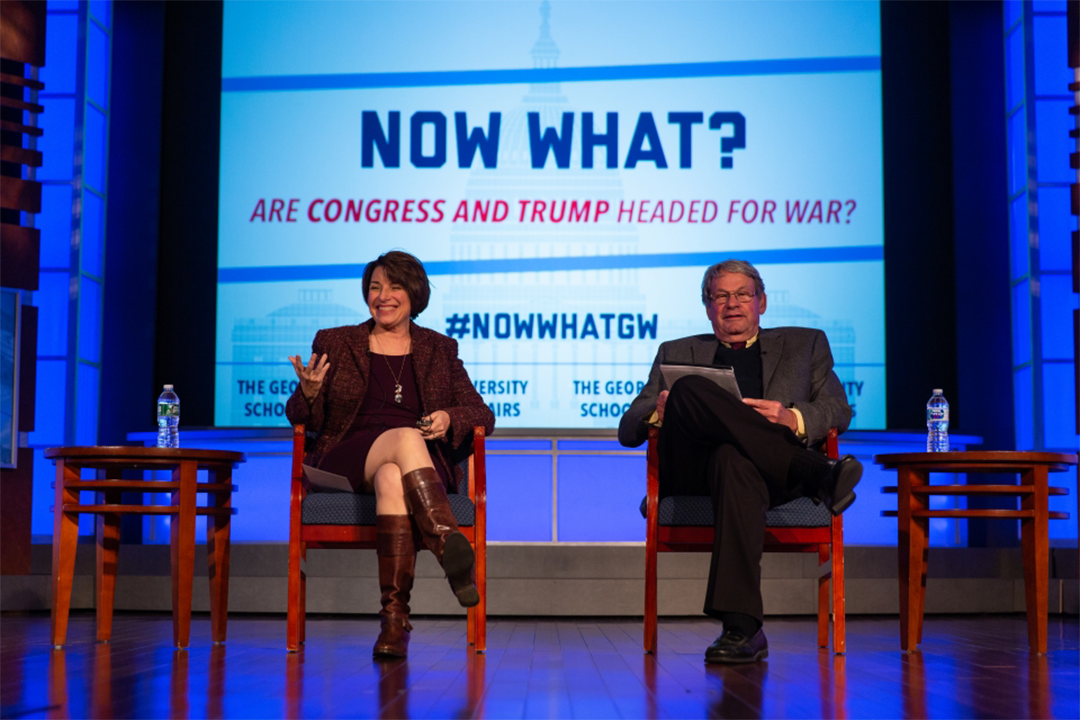This article originally appeared on GW Today .
By B.L. Wilson
With Democrats set to hold a majority in the House of Representatives as Republicans continue to control the Senate and the White House, the George Washington University School of Media and Public Affairs took on the question of how a divided government will operate.
Three panels — with opening remarks from SMPA Director Frank Sesno — featured members of the Washington political and media establishment in a discussion at the Jack Morton Auditorium Thursday evening titled, “Now What? Are Trump and Congress Headed for War?”
The answer, according to Sen. Amy Klobuchar (D-Minn.), is no.
The question was prompted by President Donald Trump’s response during a White House press briefing about House Democrats launching investigations of his administration. He said, “It would be a war-like posture.”
In the conversation that followed with moderator Steven Roberts, SMPA J.B. and M.C. Shapiro professor, Sen. Klobuchar said the Senate should be talking about the rule of law and making sure the special prosecutor’s Russia investigation continues.
Sen. Klobuchar said Democrats won big because Americans wanted to see a check and balance on the Trump administration and wanted Congress to protect pre-existing conditions under the Affordable Care Act and to control prescription drug prices.
“Voters were saying, ‘What has happened to me,’” she said. “The tax bill was seen as a mixed bag but overall not helping them.”
As for the president’s staking out a “war-like posture,” Sen. Klobuchar said she expects Trump to continue with similar rhetoric. “It is our job to offer something different to the American people, a positive, optimistic economic agenda
She said the midterm elections taught her that “it is really important to meet emotion with emotion.”
“We learned from these campaigns, (the president) is going to get a lot of attention because it sells on the news,” she said, whether it was the battle over Supreme Court nominee Brett Kavanaugh or the “caravan” of asylum seekers heading toward the U.S. border. “You’ve got to set your own agenda.”
A second panel featured Reps. Jenniffer González-Colón (R-Puerto Rico) and Brendan Boyle (D-Pa.).
Rep. González said the message she got from the midterm elections results was the importance of compromise because voters want Congress to get things done.
“Compromising and reaching agreement does not mean surrender,” she said.
Rep. Boyle said opportunities for compromise are present. He noted that rebuilding the country’s infrastructure was a goal on President Trump’s agenda and a point where Democrats could work with the White House.
During a Q & A, several members of the audience asked Rep. González about the administration’s response in Puerto Rico in the aftermath of Hurricane Maria. She defended the administration saying, “This is the first time we had people on the ground, before, during and after the hurricane.
“Everything we’ve asked for has been delivered by the president,” she said.
Rep. Boyle said the biggest issue fueling divisions in the United States and other Western countries is the economic imbalance between blue-collar workers and the college-educated middle class for whom life has never been better. “All of us need to do a better job figuring out this issue,” he said.
The evening’s final panel consisted of journalists and media pundits whose focus included the revocation of the White House press pass of CNN correspondent Jim Acosta.
Maggie Haberman, a New York Times reporter, said that she wasn’t sure that the press corps and the White House could find common ground on the issue. “President Trump came in with war-like posture day one,” she said. Looking toward 2020 presidential election, she said she expects campaigns “are going to be very, very ugly” because “Trump doesn’t have a different speed.”
Kevin Madden, a conservative CNN commentator, said the problem is the media has become the story, is too focused on access and in some respects has now become an opponent of the White House.
Shawn Turner, an SMPA Terker Distinguished Fellow and a White House deputy press secretary in the Obama administration, said members of the media are debating how the press is handling relations with Trump.
“The media needs to get outside of Washington and outside the arena,” he said.


